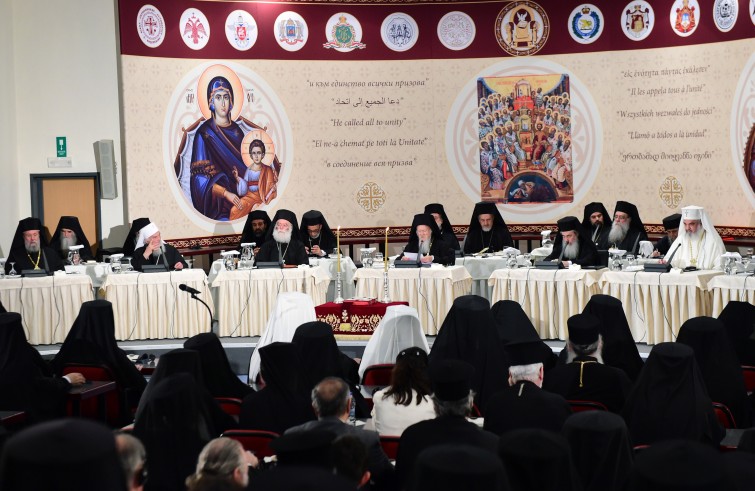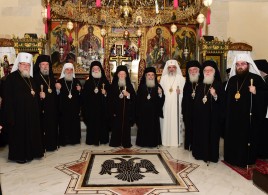
A document on the social doctrine of the Orthodox Church has been published and distributed worldwide in 12 languages. The Orthodox world as a whole has undertaken such an initiative for the first time and under the aegis of the Ecumenical Patriarchate of Constantinople, driven by the need to address the unique challenges of the modern world in a comprehensive manner. The document – entitled “For the life of the world. Towards a Social Ethos of the Orthodox Church” and accessible online – is divided into 9 paragraphs which include an introduction and a conclusion, delving into various major themes: poverty, wealth and civil justice; war, peace, violence; ecumenical relations and relations with other faiths; orthodoxy and human rights; science, technology and the human world. Each of these sections encompasses issues such as climate change, consumerism, democracy and racism, women, marriage and divorce, monasticism with reference to celibacy, as well as the great scourges of sexual abuse, slavery and war. The purpose of the document – reads the accompanying communiqué – “is to offer a reference on vital issues and challenges in the world today in ways that are consistent with living as Orthodox Christians.” The document is not envisioned as a “dogmatic decree” – sources from the Patriarchate told SIR – on major issues of the modern world, in the knowledge that
Only by proceeding from a “common vision” in an ever open exchange of views can the Church engage in dialogue with contemporary society and offer an evangelical word to the modern world.
 Such an initiative is unprecedented in the history of the Orthodox Church. It originated in 2016, in the context of the Holy and Great Council of the Orthodox Church in Crete. On that occasion the representatives and leaders of the Orthodox Churches sought to address contemporary social issues. The Ecumenical Patriarch understood the continued need, “in the spirit of the Council”, to further this effort. He thus appointed a special commission of theologians in 2017. The latter, with the input from the different provinces of the Ecumenical Patriarchate, drafted a document for submission to and approval by the Synod, which was granted in 2019. The composition of the Commission itself is also of historic relevance. In fact it includes not only Church dignitaries and members of the clergy but also comprises laity, including two women. All members of the special commission are theologians and scholars from Europe and Asia, as well as the United Kingdom and the United States. The document was formally endorsed by the Ecumenical Patriarch who approved its “formal publication as the fruit of a collective theological achievement” carried out with “wisdom and prudence.”
Such an initiative is unprecedented in the history of the Orthodox Church. It originated in 2016, in the context of the Holy and Great Council of the Orthodox Church in Crete. On that occasion the representatives and leaders of the Orthodox Churches sought to address contemporary social issues. The Ecumenical Patriarch understood the continued need, “in the spirit of the Council”, to further this effort. He thus appointed a special commission of theologians in 2017. The latter, with the input from the different provinces of the Ecumenical Patriarchate, drafted a document for submission to and approval by the Synod, which was granted in 2019. The composition of the Commission itself is also of historic relevance. In fact it includes not only Church dignitaries and members of the clergy but also comprises laity, including two women. All members of the special commission are theologians and scholars from Europe and Asia, as well as the United Kingdom and the United States. The document was formally endorsed by the Ecumenical Patriarch who approved its “formal publication as the fruit of a collective theological achievement” carried out with “wisdom and prudence.”
 In the preface of the document, the Chair of the Special Commission Rev. Dr. John Chryssavgis remarks: “The task of producing a single statement of the social doctrine of the Orthodox Church is of its nature a complicated, not to say contentious, undertaking. The Orthodox Church operates within a vast variety of cultural and historical contexts, each with its own social and political concerns and traditions.” Moreover, the Orthodox world recognized that “in our time, the Church frequently finds itself ill-prepared to respond to the realities of pluralism and globalization, or for that matter of individualism and secularization. In many societies, the Church is tempted simply to stand in opposition to the world, often sweepingly denouncing and despising all its forms and fashions.” In the document, the theological scholars write:
In the preface of the document, the Chair of the Special Commission Rev. Dr. John Chryssavgis remarks: “The task of producing a single statement of the social doctrine of the Orthodox Church is of its nature a complicated, not to say contentious, undertaking. The Orthodox Church operates within a vast variety of cultural and historical contexts, each with its own social and political concerns and traditions.” Moreover, the Orthodox world recognized that “in our time, the Church frequently finds itself ill-prepared to respond to the realities of pluralism and globalization, or for that matter of individualism and secularization. In many societies, the Church is tempted simply to stand in opposition to the world, often sweepingly denouncing and despising all its forms and fashions.” In the document, the theological scholars write:
“All too often, those who presume to speak for Orthodox tradition believe that the Church can preserve her integrity only by turning blindly away from the present and uncritically toward the past, seeking shelter in a petrified and sentimentalized vision of the Christian orders of earlier centuries.”
The tradition “is much more than a static deposit inherited from the past”, and “it is not simply a memorial to the words of the Fathers of old.” It is rather “living and dynamic reality.” For this reason, in the drafting of the text, the Special Commission “tried to avoid nebulous abstractions and sweeping generalizations”, and “to steer well clear of simplistic, pietistic, or legalistic pronouncements” and of “language and intonations of judgment or condemnation.”
 “God did not send his Son into the world to judge the world, but that, through him, the world might be saved.”“The Orthodox Church – reads the conclusion – sees it as her calling to condemn cruelty and injustice, the economic and political structures that abet and preserve poverty and inequality, the ideological forces that encourage hatred and bigotry; but it is not her calling to condemn the world, or nations, or souls. Her mission is to manifest the saving love of God given in Jesus Christ to all creation.”
“God did not send his Son into the world to judge the world, but that, through him, the world might be saved.”“The Orthodox Church – reads the conclusion – sees it as her calling to condemn cruelty and injustice, the economic and political structures that abet and preserve poverty and inequality, the ideological forces that encourage hatred and bigotry; but it is not her calling to condemn the world, or nations, or souls. Her mission is to manifest the saving love of God given in Jesus Christ to all creation.”











